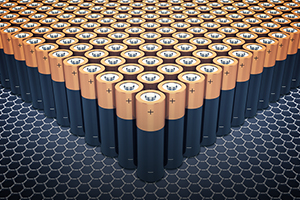Lithium Ion Alternative

About a year ago, a polymer was discovered that had the potential to store up to 10,000 times more energy than conventional lithium-ion batteries. Now researchers have used the novel material to construct a supercapacitor that could replace lithium-ion batteries in electric vehicles.
While supercapacitors are useful as power sources in certain applications, a major drawback has been their inability to store large amounts of power. Because of this, their use is limited to situations where they can be recharged often. But the new polymer changes all of that, while bringing with it some real benefits. For example, in the transportation industry, the new supercapacitors would give electric vehicles a range similar to their non-electric counterparts, but could potentially charge much more quickly than lithium-ion batteries. Although supercapacitors in general do not hold a charge as long as a battery, they would also provide an alternative power storage solution for renewable energy.
While further testing is needed before the technology is ready for commercialization, consumers will realize several benefits to the use of supercapacitors over lithium-ion batteries in the future, including lower cost, increased robustness and safer operation.
For information: Ian Hamerton, University of Bristol, Department of Aerospace Engineering, Queens Building, University Walk, Clifton BS8 1TR, United Kingdom; phone: +44-(0)117-331-4799; email: ian.hamerton@bristol.ac.uk; website: http://www.bristol.ac.uk/